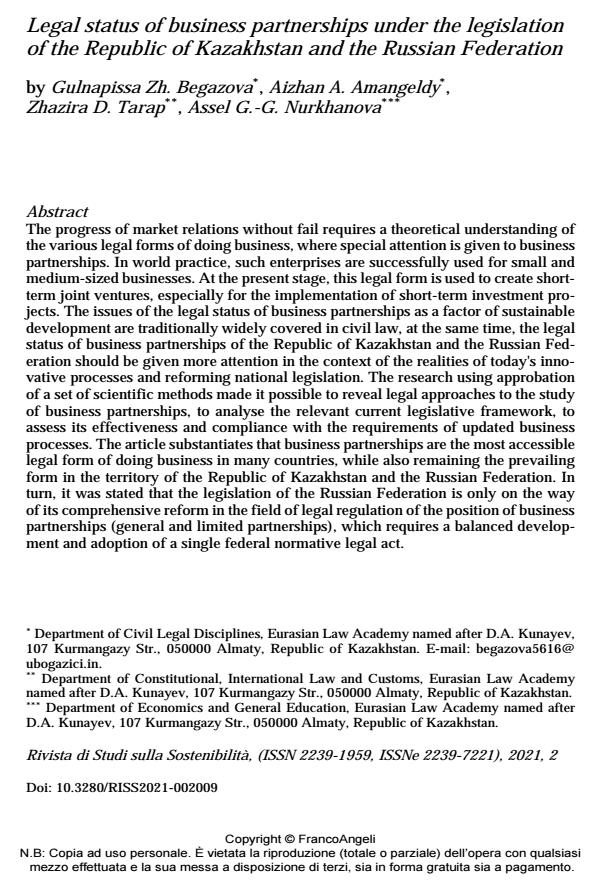Legal status of business partnerships under the legislation of the Republic of Kazakhstan and the Russian Federation
Journal title RIVISTA DI STUDI SULLA SOSTENIBILITA'
Author/s Gulnapissa Zh. Begazova, Aizhan A. Amangeldy, Zhazira D. Tarap, Assel G.-G. Nurkhanova
Publishing Year 2022 Issue 2021/2
Language English Pages 15 P. 111-125 File size 112 KB
DOI 10.3280/RISS2021-002009
DOI is like a bar code for intellectual property: to have more infomation
click here
Below, you can see the article first page
If you want to buy this article in PDF format, you can do it, following the instructions to buy download credits

FrancoAngeli is member of Publishers International Linking Association, Inc (PILA), a not-for-profit association which run the CrossRef service enabling links to and from online scholarly content.
The progress of market relations without fail requires a theoretical understanding of the various legal forms of doing business, where special attention is given to business partnerships. In world practice, such enterprises are successfully used for small and medium-sized businesses. At the present stage, this legal form is used to create short-term joint ventures, especially for the implementation of short-term investment projects. The issues of the legal status of business partnerships as a factor of sustainable development are traditionally widely covered in civil law, at the same time, the legal status of business partnerships of the Republic of Kazakh-stan and the Russian Federation should be given more attention in the context of the realities of today's innovative processes and reforming national legislation. The research using approbation of a set of scientific methods made it possible to reveal legal approaches to the study of business partnerships, to analyse the relevant cur-rent legislative framework, to assess its effectiveness and compliance with the re-quirements of updated business processes. The article substantiates that business partnerships are the most accessible legal form of doing business in many coun-tries, while also remaining the prevailing form in the territory of the Republic of Kazakhstan and the Russian Federation. In turn, it was stated that the legislation of the Russian Federation is only on the way of its comprehensive reform in the field of legal regulation of the position of business partnerships (general and lim-ited partnerships), which requires a balanced development and adoption of a sin-gle federal normative legal act.
Keywords: general partnerships, limited partnerships, registering authority, economic activity, limited liability partnership, additional liability partnership.
Gulnapissa Zh. Begazova, Aizhan A. Amangeldy, Zhazira D. Tarap, Assel G.-G. Nurkhanova, Legal status of business partnerships under the legislation of the Republic of Kazakhstan and the Russian Federation in "RIVISTA DI STUDI SULLA SOSTENIBILITA'" 2/2021, pp 111-125, DOI: 10.3280/RISS2021-002009